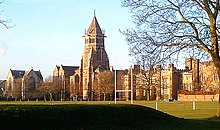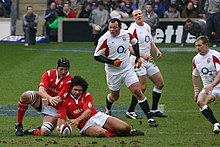Rugby Union in England
Rugby Union is a popular sport in England . The invention of rugby is attributed to William Webb Ellis , whois said to have picked up the ball during a football gamein the town of rugby in 1823and ran with it to score a goal. The first international match took place in 1871, against Scotland.
The most important competition is the professional league Aviva Premiership , which is considered to be one of the financially strongest leagues in the world. The English national team takes part in the annual Six Nations tournament and was the first world champion from the northern hemisphere after winning the final at the Rugby Union World Cup in 2003 . Both in the 2007 Rugby World Cup and in the Rugby World Cup 2019 England was indeed the final, but both times was beaten the Springboks from South Africa.
The responsible association is the Rugby Football Union (RFU), founded in 1871 , to which around 1900 clubs with 1.4 million registered players are affiliated.
history
The inventor of rugby is said to be William Webb Ellis , who in 1823 at the Rugby School (a renowned boarding school) “in fine disregard for the rules of football as it was played in his day, was the first to take the ball in his hands, run away with it and so on established the defining characteristic of the game of rugby ”. Guy's Hospital Football Club , which was founded in 1843 at Guy's Hospital in London , is said to be one of the oldest clubs, perhaps even the first . The club played an early variant of rugby and consisted of former students from the rugby school. As a result, other clubs were formed.
On October 26, 1863, the Football Association was founded in London with the aim of uniting the most widespread game features in a uniform set of rules. Disagreements over which items should be left out led to the withdrawal of Blackheath RC from the association. Other clubs followed this example. In 1870, the Richmond FC invited "all those who play a rugby-like game" to set a binding set of rules, "since the different interpretations of the rules make encounters between individual clubs difficult". Representatives of 21 clubs met on January 26, 1871 in London's Pall Mall restaurant and founded the Rugby Football Union (RFU).
On March 27, 1871, the first international match took place at Raeburn Place in Edinburgh , with Scotland winning against England. In 1886 the RFU decided not to join the International Rugby Football Board founded by Ireland, Scotland and Wales , as it would be better represented in the association due to the larger number of clubs. Because the other countries then boycotted England in the Home Nations Championships (later Five Nations, Six Nations ), the RFU finally joined four years later.
Another source of conflict in the 1890s was the question of whether players should be compensated for the loss of earnings. In particular, clubs in the north of England, where the proportion of players from the working class was significantly higher than in the south, came into conflict with the rules of amateurism more and more often, and the RFU imposed more and more game bans on clubs and individual players from the north. 22 clubs entered from the RFU and founded on August 29, 1895 in Huddersfield its own association, the Northern Rugby Football Union . This is considered to be the birth of rugby league .
At the 1908 Olympic Games , which took place in London, Great Britain was represented in the rugby tournament by the county selection from Cornwall , which won the silver medal. In 1909, the Twickenham Stadium was opened, which has since hosted almost all of the national team's international matches. During and after the First World War , from 1915 to 1920, the Five Nations tournament did not take place. The tournament was also canceled from 1940 to 1946, during the Second World War . For the duration of the war, the RFU temporarily lifted the otherwise strict ban on rugby league players. The association also allowed two “Rugby Union versus Rugby League” games to be held for charity.
For a long time, the RFU had spoken out against league competitions. She feared that this would make it easier for players to pay. For this reason, most of the meetings between different clubs were friendlies. In addition, there was also a cup and a league competition for the county teams. In 1972 the RFU allowed a cup competition for club teams to be held for the first time, today's EDF Energy Cup . In 1987, a system was finally introduced with dozens of leagues classified according to skill level, including promotion and relegation. After the world association opened rugby union to professional players in 1995, the top division changed into a pure professional league.
Competitions
The top rugby union league in England is the Aviva Premiership , which consists of twelve teams . It consists entirely of professional players, but a salary cap applies . Below the Premiership is the RFU Championship with professional and (mostly) semi-professional teams. The third division, the National Division 1, includes teams with semi-professionals and amateurs. There are numerous amateur leagues among them.
The Heineken Cup is the higher of the two European cup competitions. Teams from England, France, Ireland, Wales, Scotland and Italy are represented. The second European Cup is the European Challenge Cup , in which Romanian teams also take part.
The cup competition for club teams, the EDF Energy Cup , was initially open to all teams. Since 2005, however, only teams from the Guinness Premiership and Welsh representatives from the Pro12 take part. The cup winner is automatically qualified for the Heineken Cup.
National team
The English national team is the most successful in the traditional Six Nations tournament . She has won more titles and reached more Grand Slams than any other participant. As part of the Six Nations, the team will play against Scotland for the Calcutta Cup and against Ireland for the Millennium Trophy .
2003 England won the World Cup and reached in 1991, 2007 and 2019, the final of the World Cup . In the World Rugby world rankings , England is always one of the top ten of a total of over 100 teams. The home games are played almost exclusively at Twickenham Stadium in south-west London. Every four years or so, the British and Irish Lions go on tour, a team with players from England, Ireland, Scotland and Wales.
popularity
Historically, rugby union in England was more of a popular sport than a spectator sport, and club games were sparsely attended. In contrast, the number of spectators at international matches for the national team was always extremely high. Since winning the world title in 2003, however, rugby union has grown in popularity.
In terms of audience numbers, the Guinness Premiership is the fourth largest sports league behind the Premier League , the Football League Championship (both soccer) and the Super League (Rugby League). The average number of viewers per game is around 18,000 (as of 2016). Due to the increased demand, some teams have moved to larger stadiums and are expanding their existing stadiums. International matches are broadcast on free TV, championship matches are usually broadcast on pay TV.
See also
Web links
- Rugby Football Union
- Rugby news from planet-rugby.com ( Memento from October 23, 2008 in the Internet Archive )
- BBC rugby news
- Directory of all rugby clubs-Rugby Club Directory ( Memento of May 15, 2008 in the Internet Archive )



